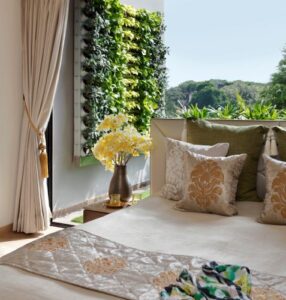Architect Anurag Pashine & Architect Pallavi Pashine
Architectural design has evolved over centuries and continuously adapted to the transforming needs of society. Each decade moves forward with the modernisation of practices as our architectural knowledge deepens and as we become aware of different resources to improve sustainable construction. With the growing realisation of the long-term impacts of buildings on the environment, contemporary design methods promote modern sustainability while ensuring classic generosity. Here we share some contemporary design techniques that are a polyphony of modern sustainability and classic generosity and.

Recycled materials
The contemporary design forces a focus on each phase of the design for a holistic approach to the entire life cycle from procurement through operations and maintenance, and it paved the way for the popularity of recycled materials. Recyclable materials have a diverse range of applications in contemporary building design. With emerging building trends, we witness increased use of AAC blocks in the construction of almost every structure. Architects and designers prefer reclaimed wood over standard hardwood or carpet finishes options. This brings the realm of sustainability without sacrificing the classic aesthetics of design. Alternative options such as cork and recycled glass also come with a long list of benefits. Glass tiles, for instance, are non-absorptive and do not foster any mould or mildew.
Smart Design Technologies
The future of ecological sustainability in built environments relies on the thoughtful deployment of eco-friendly and smart technologies for robust energy management. This involves using cutting-edge technology to minimise environmental impact by identifying and reducing waste that increases efficiency while simultaneously improving safety, comfort, and security.
Apart from the use of earth or recycled building materials, architects can also employ new technical or design interventions to create sustainable architecture. Innovative solutions are constantly being iterated upon from smart lighting that can account for a building’s energy use and storage to cool roofs that insulate summer heat. LED chandeliers and motion sensor lighting in homes tend to be smart solutions while also improving the ambience of the space. The various smart appliances and fixtures such as intelligent security systems, and automated heating and cooling systems promote sustainability while ensuring comfort. Inanimate objects in a home, such as walls, doors, ceilings, windows, lights, and even switches, can now communicate using intelligent technologies.
Passive design strategies
A building designed with passive architectural features can significantly reduce the mechanical forms of cooling and heating systems, which, in turn, reduces carbon emissions. The choices of a white or light-coloured roof that reflects sunlight and large UPVC windows that maintain internal temperature and good ventilation are some of the passive techniques that make a sustainable structure. Buildings can be optimally placed and aligned according to the wind directions and sun angles to keep them naturally heated during the winters and cooler during the summers. You can also install solar panels to help the planet, and they are an attractive addition that instils a modern sleekness to classic architecture.
Greenery- Sustainability at its best
Green roofs and green walls are aesthetically pleasing for homes and at the same time, serve as an environmentally-friendly choice. Having a healthy life, being close to nature, and contributing to sustainable goals have become the trend of recent times. Contemporary homes include green roofs and greenery in balconies for a mix of efficient natural cooling and landscaped aesthetic beauty. Greenery reduces air pollution and absorbs storm water runoff. They also lower energy costs and extend the life of the roof structure. Today green walls and roofs have become a viable option that dresses up healthy homes with charm.
Architect Anurag Pashine & Architect Pallavi Pashine Founding Partners of Salankar Pashine & Associates